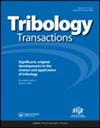Identification of Stribeck model parameters to accurately reveal stick–slip characteristics of a disc–block friction system
IF 2.2
3区 工程技术
Q2 ENGINEERING, MECHANICAL
引用次数: 0
Abstract
AbstractStick–slip vibration is simultaneously influenced by several factors which share complicated coupling relationships. In this research, an experimental investigation was performed to analyze the evolution law of stick–slip characteristics at different working conditions using a tribometer. The results showed that the disc rotational speed and normal force had noticeable impact on both stick–slip vibration and coefficient of friction (COF). Then, the Stribeck model, which can characterize COF characteristics in the stick–slip process, was employed and the parameters were identified to construct a dynamic relationship between working conditions and COF. Further, the numerical simulations respectively considering and neglecting the dynamic relationship between working conditions and Stribeck model parameters were conducted via an established tribometer analytical model. It was found that the simulation results considering the influence of working conditions on Stribeck model parameters were in better agreement with the experimental results as the stick–slip vibration depends on the combined effect of working conditions and Stribeck model parameters. Therefore, the dynamic relationship between working conditions and Stribeck model parameters is crucial to accurately reveal stick–slip characteristics.Keywords: stick–slip vibrationStribeck modelcoefficient of frictionparameter identificationnumerical simulationDisclaimerAs a service to authors and researchers we are providing this version of an accepted manuscript (AM). Copyediting, typesetting, and review of the resulting proofs will be undertaken on this manuscript before final publication of the Version of Record (VoR). During production and pre-press, errors may be discovered which could affect the content, and all legal disclaimers that apply to the journal relate to these versions also. AcknowledgementsThe authors are grateful for the financial support of the National Natural Science Foundation of China (No. U22A20181, 52205217), the Natural Science Foundation of Sichuan (No. 2022NSFSC1964) and the Fundamental Research Funds for the Central Universities (2682021CX025).识别Stribeck模型参数,准确揭示盘块摩擦系统的粘滑特性
摘要粘滑振动是由多种因素同时影响的,这些因素具有复杂的耦合关系。本文利用摩擦计进行了试验研究,分析了不同工况下粘滑特性的演化规律。结果表明:圆盘转速和法向力对粘滑振动和摩擦系数均有显著影响;然后,采用能够表征粘滑过程中COF特性的Stribeck模型,辨识参数,建立工况与COF的动态关系;通过建立的摩擦计分析模型,分别对考虑工况与Stribeck模型参数动态关系和忽略工况与Stribeck模型参数动态关系进行了数值模拟。研究发现,考虑工况对Stribeck模型参数影响的仿真结果与实验结果吻合较好,因为粘滑振动是工况与Stribeck模型参数共同作用的结果。因此,工况与Stribeck模型参数之间的动态关系对于准确揭示粘滑特性至关重要。关键词:粘滑振动斯特里贝克模型摩擦系数参数识别数值模拟免责声明作为对作者和研究人员的服务,我们提供此版本的接受稿件(AM)。在最终出版版本记录(VoR)之前,将对该手稿进行编辑、排版和审查。在制作和印前,可能会发现可能影响内容的错误,所有适用于期刊的法律免责声明也与这些版本有关。作者感谢国家自然科学基金项目(No. 5)的资助。四川省自然科学基金项目(No. 2022NSFSC1964)和中央高校基本科研业务费专项基金项目(No. 2682021CX025)。
本文章由计算机程序翻译,如有差异,请以英文原文为准。
求助全文
约1分钟内获得全文
求助全文
来源期刊

Tribology Transactions
工程技术-工程:机械
CiteScore
3.90
自引率
4.80%
发文量
82
审稿时长
4 months
期刊介绍:
Tribology Transactions contains experimental and theoretical papers on friction, wear, lubricants, lubrication, materials, machines and moving components, from the macro- to the nano-scale.
The papers will be of interest to academic, industrial and government researchers and technologists working in many fields, including:
Aerospace, Agriculture & Forest, Appliances, Automotive, Bearings, Biomedical Devices, Condition Monitoring, Engines, Gears, Industrial Engineering, Lubricants, Lubricant Additives, Magnetic Data Storage, Manufacturing, Marine, Materials, MEMs and NEMs, Mining, Power Generation, Metalworking Fluids, Seals, Surface Engineering and Testing and Analysis.
All submitted manuscripts are subject to initial appraisal by the Editor-in-Chief and, if found suitable for further consideration, are submitted for peer review by independent, anonymous expert referees. All peer review in single blind and submission is online via ScholarOne Manuscripts.
 求助内容:
求助内容: 应助结果提醒方式:
应助结果提醒方式:


